How to Create a Healthy Environment for a Pet Iguana

From their allergy-friendly characteristics to their calm disposition, iguanas are fascinating creatures that many enjoy having as pets. But these exotic reptiles have very unique needs—especially when it comes to their habitat. If you’re thinking about inviting this cold-blooded companion into your home, you’ll need to make sure you have all the right resources to provide a safe and comfortable living environment. To help you create a space that your lizard will love, here are five iguana housing tips veterinarians recommend.
5 Beginner Tips for Housing an Iguana
1. Get a Spacious Enclosure
To prevent your pet from wandering away or climbing into dangerous areas, you should provide them with a sturdy enclosure that allows for ample movement. Since these reptiles can grow to be very large, you’ll need to make sure the cage is at least eight feet long.
2. Provide Bedding
Similar to turtles, iguanas should have a layer of bedding for comfort and hygiene. Shredded newspaper, alfalfa pellets, towels, and artificial turf can all make great bedding materials. However, veterinarians strongly recommend against using materials that can be harmful or toxic for iguanas. This includes cedar wood chips, cat litter, and gravel.
3. Install Heat & UVB Lamps
 As cold-blooded creatures, iguanas require a habitat that allows them to adjust their body temperature throughout the day. Install a reptile-friendly heat lamp or pad that can keep one area of the cage around 95 degrees, but allow the other end to be cooler at around 75 degrees. UVB lamps are also essential because they help iguanas produce vitamin D3, a nutrient necessary for bone health.
As cold-blooded creatures, iguanas require a habitat that allows them to adjust their body temperature throughout the day. Install a reptile-friendly heat lamp or pad that can keep one area of the cage around 95 degrees, but allow the other end to be cooler at around 75 degrees. UVB lamps are also essential because they help iguanas produce vitamin D3, a nutrient necessary for bone health.
4. Maintain Humidity Levels
A humid environment helps iguanas shed their coats so they can maintain healthy skin. Ideally, their enclosures should offer an average humidity level of about 70%—a condition you can measure with a tool known as a hygrometer. To achieve this, simply keep a fresh pool of water inside the cage.
5. Decorate With Function
Several accessories can give your iguana’s enclosure a polished look as well as help your pet stay active. At a minimum, you should provide a large tree branch for climbing, rocks for basking, and a hide house for resting and privacy. If you want to decorate the space with plants, ask your veterinarian for recommendations, as some may be toxic or harmful to your lizard.
While a well-equipped enclosure can do a lot to support iguana health, you’ll also need a trusted veterinarian by your side to help address any reptile health concerns. Providing care for many creatures, including reptiles and other exotic pets, Thomas Animal Medical Center is a top resource for iguana owners in La Crosse, WI. As an AAHA-accredited facility, this veterinary clinic has the resources and experience necessary to address routine health issues, as well as emergencies. Visit this local vet online to learn more about their accessible and affordable care or call (608) 788-8820 to schedule a convenient pet wellness exam.
About the Business
Have a question? Ask the experts!
Send your question

